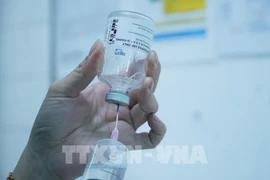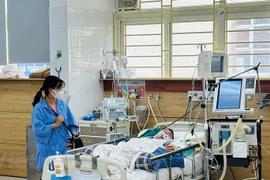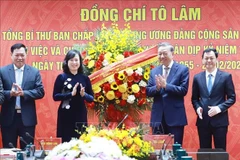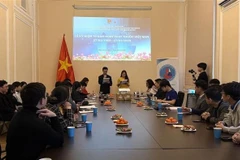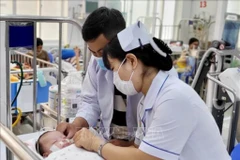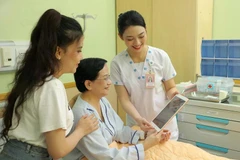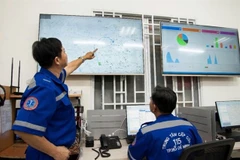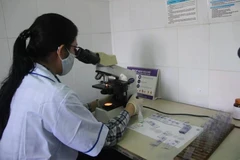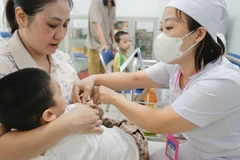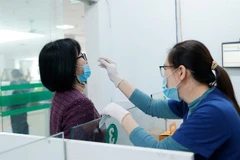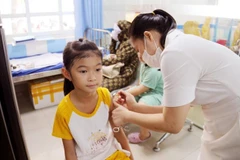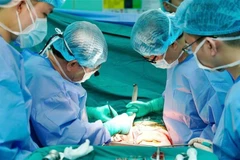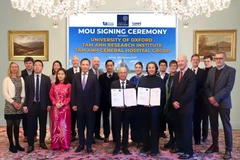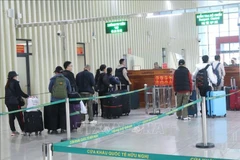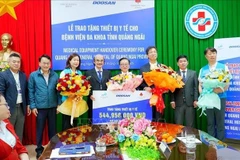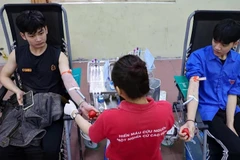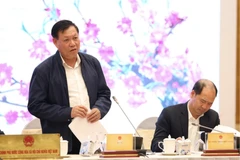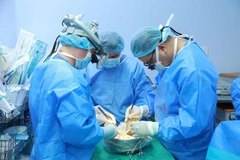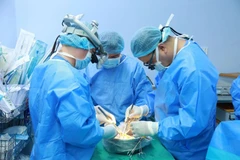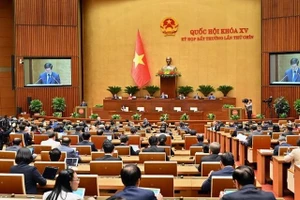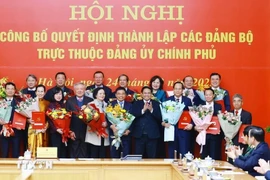 The detoxification centre at the Bach Mai Hospital in Hanoi employs methods to detect risks and propose solutions for specific treatment. (Photo: VietnamPlus)
The detoxification centre at the Bach Mai Hospital in Hanoi employs methods to detect risks and propose solutions for specific treatment. (Photo: VietnamPlus)
Hanoi (VNA) - About the issue of treating patients with poisoning, VietnamPlus reporters had a discussion with Dr. Nguyen Trung Nguyen, the director of the detoxification centre at the Bach Mai Hospital in Hanoi, to gain a clearer insight into the current landscape of poisoning prevention and treatment as well as related shortcomings that need to be addressed.
According to the expert, currently, the risk of poisoning in daily life exists in many forms due to Vietnam’s rapid integration with the rest of the world. These include medicines, plant protection chemicals, narcotics, natural toxins, and household chemicals.
The causes of poisoning can come from various sources, but external factors are numerous. Therefore, Nguyen highlighted the need to establish a system of functional agencies like the Ministry of Industry and Trade, and the Ministry of Agriculture and Rural Development to prevent hazardous chemicals from entering the country.
 The risk of poisoning in daily life now exists in many forms due to numerous causes. (Photo: VietnamPlus)
The risk of poisoning in daily life now exists in many forms due to numerous causes. (Photo: VietnamPlus)
The work of treating poisoning is where the consequences were gathered and addressed. It is also the last line of defence, involving such tools as disease treatment, diagnosis, toxicological testing, consultation, community education, and the monitoring and prevention of poisoning.
“At the detoxification centre, we analyse and detect poisoning cases to identify potential risks and recurring incidents like specific behaviors, habits, or unsafe shared products,” Nguyen noted. Based on these, doctors will advise relevant authorities for intervention and prevention.
In principle, most cases of poisoning can be prevented. However, challenges are lingering in the field of treatment, diagnosis and testing due to the emergence of new diseases. These diseases change continuously over time, some of which have yet to be cited in medical texts.
“When we discover new diseases or diseases without established treatment protocols, we must create our own treatment protocols,” Nguyen said.
 Dr. Nguyen Trung Nguyen, the director of the detoxification centre at the Bach Mai Hospital in Hanoi (Photo: VietnamPlus)
Dr. Nguyen Trung Nguyen, the director of the detoxification centre at the Bach Mai Hospital in Hanoi (Photo: VietnamPlus)
In the long term, the detoxification centre has come up with a mechanism to detect risks and propose solutions based on specific cases under treatment. These methods include consultations, conferences, phone calls, notices from citizens and healthcare workers, and chemical information recorded in a management software system.
Detoxification centres in the north, south, and central regions have their data linked for analysing information synchronously.
Nguyen further elaborated that whenever management agencies request, doctors can actively provide the latest information on unsafe drugs, toxic chemicals causing poisoning, and sudden increases in poisoning cases. Such factors are early detected and timely reported to the agencies so that they can have preventive measures to stop them from spreading when only one or two cases are identified and prevent similar incidents in the future.
The doctor stressed that the work of poisoning prevention and control is not just for the benefit of certain patients, but it also involves remote prevention and community education to make life safer.
 In principle, most cases of poisoning can be prevented. However, challenges are lingering in the field of treatment, diagnosis and testing due to the emergence of new diseases. (Photo: VietnamPlus)
In principle, most cases of poisoning can be prevented. However, challenges are lingering in the field of treatment, diagnosis and testing due to the emergence of new diseases. (Photo: VietnamPlus)
However, he pointed to a fact that the sector of detoxification in Vietnam has yet to receive sufficient investment, especially considering the current trend where hospitals have to be self-financing.
Poisoning prevention is a shared public duty, the expert said. In countries with economic development, the government takes care of this issue, ensuring a regular budget for the detoxification field. Self-financing hospitals must secure a regular State investment in detoxification, epidemic prevention, and related training activities, he recommended./.


